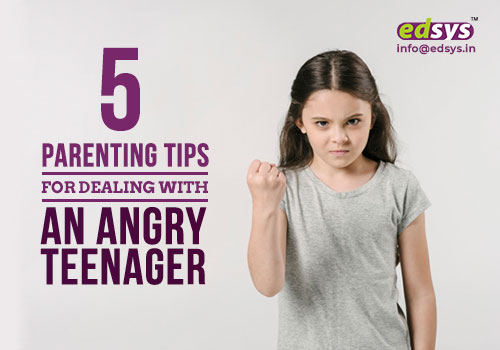Categories(658 Blogs)
Select Category
Watch Right Now
Teacher App - Class
Schedule & Attendance Management App
Parent App from Edsys

Best School Bus Tracking System

Cashless School - For Smart Schools of Tomorrow


5 Parenting Tips for Dealing with an Angry Teenager

For parents, the first few years of taking care of a child seem overwhelming. But as the child grows, parents realize the increased challenges of parenting a kid during his or her teenage. In fact, many parents feel, as if, they are losing the kid they used to play within the backyard.
Get Best Free Parental Apps (Check it Now)
This happens to almost every parent. And this time is not just difficult for parents, kids also feel confused and go through a tsunami of new emotions as they live their teenage years.
Their biological characteristics change, which impacts their emotional understanding. At the same time, they try to understand their own place in this world. All these things turn a teenager into an angry child.
The bigger problem is their children’s inability to express and manage their anger correctly. Which is why teenagers often find themselves into trouble. Teenage kids can feel a strong need to shout, act out or other loud things to release the force of emotions they feel.
As parents, seeing your kid go through all that is hurtful, overwhelming and sad. In some cases, parents don’t know the right approach to managing their kid’s anger and end up further damaging the child’s emotional health.
You need to understand where that anger is coming from. Teenagers think and try to behave like adults, but they are not adults. They are in the process of becoming adults. The brain development keeps on happening until we complete 25 years on this planet.
If you yell back at an angry teenage child, it will only increase the pitch of the issue. An anger outburst in teenagers should be handled in a particular way to defuse the intensity. Your kids are finding themselves in the middle of the outside world and your protection. They need your protection but don’t like to be bossed around. This confusion between dependence and independence turns into angry power plays.
Know More: 11 Entertaining Ideas to make your Kids Party the Best One
The outcome of any situation with your teenage kid depends on your ability to communicate and take the right actions.
This article has 5 tips you can use in that department to obtain positive results.
1. Listen calmly before speaking
You might feel that your kid is acting out for no reason or maybe for the wrong reasons. But do not charge at the child without listening to them. Take some time and patiently hear what your child has to say.
An angry teenager wants to let it all out. If you avoid listening, it can further increase their anger. The feeling of avoidance can make your child go overboard with his or her anger. So, your goal in such situations should be to be extra attentive towards your kid and listen before you speak.
2. Find the right time to speak during a heated conversation
When your child is angry, his or her emotional intensity reaches its peak. And that emotional peak doesn’t allow the kid to hear and understand what you say. Even if you talk in their favour, they feel interrupted and get angrier.
The chances of your kid listening and communicating increase when you find the right moment to put across your point. You shouldn’t try to talk during the heated emotional outburst. Let the child say it all and calm down. Sometimes you have to spend the whole heated conversation, simply listening to your child. Then, when you find your kid calmed, you can sit and begin the conversation in a softer manner.
The process is easier said than done for sure. You may also feel anger and wish to say everything out loud. The challenge is to hold yourself and relax. The thoughts may have to stay in your mind for a few days before you get a chance to talk to your kid.
3. Make a physical release opportunity available
Mental stress is released with physical activity. Which is why you might see an angry teenager throw stuff, pacing or do other physical activities to release the stress.
You can provide a positive opportunity for your child to release from an anger teenager mindset. Find out his or her favorite sport or activity such as running, swimming, basketball or any other. Encourage your kid to join a class, so he or she can indulge in an activity for a physical release.
You can also try to take exercise classes together. This will ensure a physical release and you will get a chance to connect with your child more.
4. Allow and respect his/her privacy
Your child is in the process of becoming an adult. There is a constant urge to acquire freedom and do things as he/she pleases. And you have to respect that! Teens usually don’t prefer their parents walking in their room without knocking. It is their own castle and you can’t barge in. This gives a sense that you are trying to control your kid’s life completely. You don’t want to be perceived as a controller, it should be an image of a protector.
For that, you need to respect the boundaries and allow your kid his/her privacy. At the same time, you can make yourself available for your kid’s protection and support.
5. Don’t infantilize your teenage child
Teenagers don’t want their parents to treat them as if they are an infant. In your eyes, they will always little babies. But you can’t forget that your baby has turned into a young child and trying to become a grown boy or girl.
If you start babying their every action, it will trigger the anger and thus become angry teenager. Criticizing their actions, trying to teach them every single minute and being in their face all the time. These are the things that create unwanted situations. You can find a quiet, one-on-one time to respectfully inform about something that you don’t agree with.
Get Best Free Parental Apps (Check it Now)
To parent a teenage child, you have to treat them as grownups and protect them as a child. There has to be a perfect balance to avoid heated situations.
Know More: 24 Very Short Moral Stories For Kids
Recent Blogs
Our Educational Services
Popular Blogs
Subscribe

SUBSCRIBE TO OUR NEWSLETTER
Sign Up and Recieve the Latest News
Don’t Worry, We Don’t SpamExplore Our Extensive Researched Educational App Directory
Visit Now

















